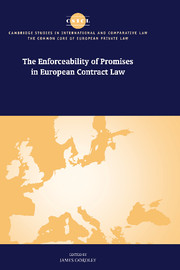Book contents
- Frontmatter
- Contents
- General editors' preface
- List of contributors
- Table of legislation
- List of abbreviations
- 1 Some perennial problems
- 2 Contemporary solutions
- Case 1 promises of gifts
- Case 2 promises of compensation for services rendered without charge
- Case 3 promises to pay debts not legally due
- Case 4 a promise to come to dinner
- Case 5 promises to store goods without charge
- Case 6 promises to do a favour
- Case 7 promises to loan goods without charge
- Case 8 a requirements contract
- Case 9 promises to pay more than was agreed I
- Case 10 promises to pay more than was agreed II
- Case 11 promises to do more than was agreed; promises to waive a condition
- Case 12 promises to take less than was agreed
- Case 13 options given without charge
- Case 14 promises of rewards
- Case 15 promises of commissions
- 3 Comparisons
- Index by country
- Index by subject
Case 10 - promises to pay more than was agreed II
Published online by Cambridge University Press: 18 May 2010
- Frontmatter
- Contents
- General editors' preface
- List of contributors
- Table of legislation
- List of abbreviations
- 1 Some perennial problems
- 2 Contemporary solutions
- Case 1 promises of gifts
- Case 2 promises of compensation for services rendered without charge
- Case 3 promises to pay debts not legally due
- Case 4 a promise to come to dinner
- Case 5 promises to store goods without charge
- Case 6 promises to do a favour
- Case 7 promises to loan goods without charge
- Case 8 a requirements contract
- Case 9 promises to pay more than was agreed I
- Case 10 promises to pay more than was agreed II
- Case 11 promises to do more than was agreed; promises to waive a condition
- Case 12 promises to take less than was agreed
- Case 13 options given without charge
- Case 14 promises of rewards
- Case 15 promises of commissions
- 3 Comparisons
- Index by country
- Index by subject
Summary
Case
Vito was an executive working for Company, a business firm, on a contract obligating him to continue working, and Company to continue employing him, for a period of ten years. Company promised to pay him a large sum of money, equal to a year's pay, (a) in the midst of his term of employment because he received an offer of immediate employment at higher pay from a competing firm, or (b) at the end of his term of employment, after he had announced his intention to retire, to thank him for his services. Is Company obliged to keep this promise? Does it matter if Vito has already bought a vacation house he could otherwise not afford?
Discussions
FRANCE
In French law, Cases 10(a) and 10(b) raise quite different questions.
The question in Case 10(a) is whether an agreement that restricts an employee's choice of employment is valid. Such a restriction is valid provided that three conditions are fulfilled: the agreement must be limited as to time; it must be limited as to space; and its purpose must be to serve a legitimate interest of the employer. If these conditions are all satisfied, the restriction is valid, but it is still subject to a special rule that is foreign to the requirement of cause in contract law: the employer is not obliged to give something in exchange for the restriction. There are two exceptions to this special rule: it does not apply when a quid pro quo is provided for by a collective agreement with a trade union or by a contract between the employer and the employee.
- Type
- Chapter
- Information
- The Enforceability of Promises in European Contract Law , pp. 239 - 254Publisher: Cambridge University PressPrint publication year: 2001
- 1
- Cited by



